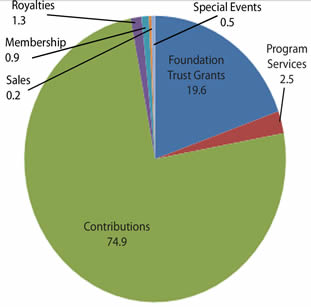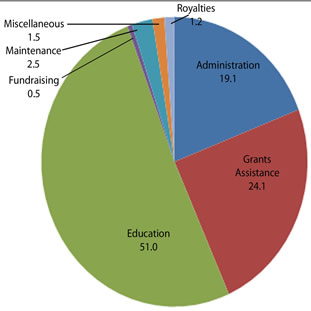Ecology Action's Annual Report for 2017
Dear Friends, Each of us is being impacted by global events that have begun to shatter our understanding of what's normal. It can feel like everything we've counted upon for stability is being overturned, leaving us on less firm ground. Like the rest of our nation and the world, Ecology Action experienced some daunting challenges during 2017. Because of these, we initiated a major restructuring and reassessed ways to most effectively assist those needing best-practice soil- and food-growing approaches. The good news is we're not only still here, but are discovering new avenues to increase the localization and outreach of the GROW BIOINTENSIVE (GB) system. After all, the plants are rooting for our success! One of the most exciting avenues is the collaboration agreement recently negotiated between Ecology Action (EA), Victory Gardens for Peace (VGfP), and the Stanford Inn by the Sea. This strengthens the relationship Ecology Action and the Inn have developed since 2010. Stanford Inn is located on the Coast, just south of the town of Mendocino, California, an area which attracts many visitors each year. The Inn has been using Biointensive practices for over three decades. The demonstration, training and research garden VGfP maintains and is expanding at the Inn will not only introduce Ecology Action to a larger audience, but also bring a greater number of people to the Inn. EA and VGfP are providing direction for the cutting-edge 10-Bed-Unit (1,000 square feet of planted surface) Soil Sustainability Research Project—started during 2017 at VGfP, Ecology Action's Mini-Farm at the Golden Rule site, ten Latin American sites, and one site in Italy. The projects in Latin America and Italy will be carried out for at least the next two years—and the one at VGfP will continue indefinitely. This is the latest phase of EA's ongoing garden research which provides the foundation for the GROW BIOINTENSIVE system—and one of our most effective methods of global outreach since Ecology Action began. The purpose of this current research project is to discover the smallest possible garden size that will provide a sustainable, complete annual diet for one person—including growing compost materials and using the least amount of the Earth's resources possible. At intermediate GB yields, this may be done in as little as 2,000 square feet of planted surface—when the right crops are chosen and the gardener's skill and the soil have been built up reasonably. At high GB yields, research indicates this may be accomplished in as little as 1,000 square feet. Matt Drewno, manager of the VGfP Mini-Farm, is writing a Self-Teaching Mini-Series booklet on this process. It was extremely rewarding for Matt Drewno and me to attend the Five-Day GB events in Nicaragua in January 2018. In 2004 Juan Manuel Martinez, director of ECOPOL, gave trainings in that country for the first time and set himself the goal of helping the country be a reference point for the GB method in all of Central America. As a result, thousands of people have been and are being trained. There are GB gardens all over the country maintained by women, men, and children, and Nicaragua's National Agricultural University is in the process of setting up a three-year GB university course for the purpose of training Biointensive Technical Specialists! It seems to me the GB program in Nicaragua can be viewed as a microcosm of what can be done—a living example for the world of a proactive, nurturing and healthful farming and gardening system. It is anticipated that 100 GB Certified Teachers at the Basic, Intermediate, Advanced and Master Levels will be active in Latin- and Central-America and the Caribbean by the end of 2018—with 85 of these in Nicaragua. I also know that at the local level each biologically intensive garden that is grown and viewed has the power to ignite a longing for community in which local food security is one of the major elements. Each of us has the ability to strengthen our community and our own inner longing to be part of something greater than ourselves by growing food in a healthy way, whether in a pot on the balcony or with our hands nurturing fertile soil in a backyard, community garden, or nearby small-scale farm. And while we nurture the soil, we also nurture ourselves and our community. Sri Kaleeshwar shares a holistic insightful perspective for us all,
Best Wishes, John Jeavons,
top | Newsletter Home | Table of Contents | Archive
|




